LATEST BOOKS
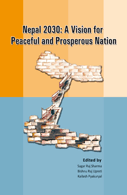
Nepal 2030: A Vision for Peaceful and Prosperous Nation
Sagar Raj Sharma, Bishnu Raj Upreti, Kailash Pyakuryal, 2012
In this volume, experts from diverse fields offer their visions of a prosperous and stable Nepal by the year 2030. Despite the social uncertainties and political instabilities Nepal continues to face in its post-conflict transition period, the authors believe that a brighter future is in reach if policymakers act wisely, swiftly, and boldly. They outline their hopes and possible paths for translating dreams of a strong, secure “New Nepal” into reality.
 Download book (4.1 MB)
Download book (4.1 MB)
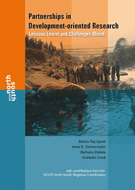
Partnerships in Development-oriented Research: Lessons Learnt and Challenges Ahead
Bishnu Raj Upreti,
Anne B. Zimmermann, Berhanu Debele, Guéladio Cissé, 2012
The challenges posed by global change processes require concerted responses from the development, research, policy, and practitioners' communities in the global North and South. A means of developing the societally relevant knowledge and holistic understanding necessary to inform such responses is through research partnerships. Research partnerships between the North and South can ensure that context-specific knowledge is generated. Transdisciplinary research partnerships can help move societies in the South and North towards more sustainable development by establishing links between research, policy, and practice. This book is based on experiences made during a 12-year research programme, the NCCR North-South. It is aimed at funders of research and development interventions, policymakers, development practitioners, and researchers themselves.
 Download book (1.9 MB)
Download book (1.9 MB)
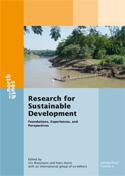
Research for Sustainable Development: Foundations, Experiences, and Perspectives
Hans Hurni, Urs Wiesmann, editors, 2011
Achieving sustainable development requires knowledge-based and value-conscious social, political, and economic decisions and actions at multiple levels. Research aiming to support sustainable development must co-produce knowledge at the interfaces between disciplines, between science and society, between knowledge cultures in the global North, South, and East, and between global visions and local realities, while remaining rooted in solid disciplinary foundations. Research for Sustainable Development presents 29 articles in which interdisciplinary teams reflect on the foundations of sustainability-oriented research, on concepts, tools, and approaches to overcome the challenges of such research, and on specific issues of sustainable development.
 Download Book (8 MB)
Download Book (8 MB)
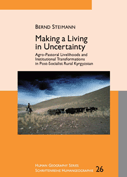
Making a Living in Uncertainty: Agro-Pastoral Livelihoods and Institutional Transformations in Post-Socialist Rural Kyrgyzstan
Bernd Steimann, 2011
Why is rural Kyrgyzstan experiencing widespread poverty and a considerable divide between the wealthy and the poor – despite twenty years of independence and sustained efforts to reform the rural economy? Drawing on an innovative livelihoods perspective with a focus on institutions, the author illustrates how the Kyrgyz agrarian reforms of the 1990s have fundamentally altered rural property relations. Not only have the reforms redefined the economic value and social significance of land and other resources, they have redefined the livelihood prospects of the rural population. Existing disparities between the asset-rich and the asset-poor have been reinforced, and their social relations have increasingly become embedded in a poorly regulated economic system.
The book provides a vivid example of the long-term effects of an agrarian “shock therapy” and shows how the introduction of seemingly “robust” institutions runs the risk of widening the existing gap between the rich and the poor.
 Download book (10.1 MB)
Download book (10.1 MB)
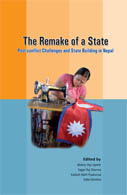
The Remake of a State: Post Conflict Challenges and State Building in Nepal
Bishnu Raj Upreti,
Sagar Raj Sharma,
Kailash Nath Pyakuryal,
Safal Ghimire, 2010
State building is a highly debated topic these days, whether referring to war-torn Iraq, conflict-ridden Afghanistan, or any number of other countries facing or recovering from acute instability. Questions of physical reconstruction and socio-economic transformation are especially crucial. The issue of state building has recently gained in importance in South Asia, particularly in the aftermath of conflicts in Sri Lanka and Nepal. The Remake of a State presents expert analysis, conceptual frameworks, and case studies relevant to sustainable state building in Nepal.
 Download book (3 MB)
Download book (3 MB)
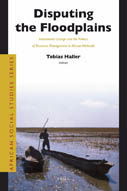
Disputing the Floodplains: Institutional Change and the Politics of Resource Management in African Wetlands
Tobias Haller, 2010
African Floodplains in semi-arid areas are important for local livelihoods as they harbor many common-pool resources such as fisheries, pasture, wildlife, veldt products, water and land for irrigation. However, in many of these areas resources are under pressure. With a Foreword by Nobel prize-winner Elinor Ostrom, this book presents seven case studies from Mali, Cameroon, Tanzania, Zambia and Botswana based on anthropological fieldwork (2002-08) and explores how these common-pool resources have been managed in pre-colonial, colonial and postcolonial times.
The major focus of the study is on how institutional change has contributed to resource management problems; the book offers a comparative analysis based on the New Institutionalist approach (Jean Ensminger, Elinor Ostrom), which is combined with a special focus on ideology, discourse and narratives while focusing on conflict and power issues.
 Download book order form (PDF / 802 KB)
Download book order form (PDF / 802 KB)
 Download Foreword by Elinor Ostrom (PDF / 70 KB)
Download Foreword by Elinor Ostrom (PDF / 70 KB)
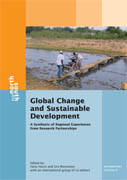
Global Change and Sustainable Development: A Synthesis of Regional Experiences from Research Partnerships
Hans Hurni, Urs Wiesmann, editors; with an international group of co-editors, 2010
Humankind today is challenged by numerous threats brought about by the speed and scope of global change dynamics. A concerted and informed approach to solutions is needed to face the severity and magnitude of current development problems. Generating shared knowledge is a key to addressing global challenges. This requires developing the ability to cross multiple borders wherever radically different understandings of issues such as health and environmental sanitation, governance and conflict, livelihood options and globalisation, and natural resources and development exist.
Global Change and Sustainable Development presents 36 peer-reviewed articles written by interdisciplinary teams of authors who reflected on results of development-oriented research conducted from 2001 to 2008. Scientific activities were – and continue to be – carried out in partnerships involving people and institutions in the global North, South and East, guided by principles of sustainability. The articles seek to inform solutions for mitigating, or adapting to, the negative impacts of global dynamics in the social, political, ecological, institutional and economic spheres.
 Download Book (30 MB)
Download Book (30 MB)
 Download Flyer (94 KB)
Download Flyer (94 KB)
 Download Introduction (429 KB)
Download Introduction (429 KB)

Decentralisation Meets Local Complexity
Local Struggles, State Decentralisation and Access to Natural Resources in South Asia and Latin America
Urs Geiser, Stephan Rist, 2009
Decentralisation Meets Local Complexity brings together insights from eight case studies in Latin America and South Asia that provide nuanced descriptions and analyses of the experiences of decentralised natural resource management. The studies are compared in a non-reductionist way through an interpretative framework drawing upon various contemporary state–society theories and human–environment perspectives.
The book goes beyond an identification of universal mechanisms of effective decentralisation. It provides a useful examination of how political contestations within and between heterogeneous communities and a non-monolithic state produce complex and often unintended outcomes for the management of natural resources as well as for the realisation of political participation as a fundamental human right.
Decentralisation meets Complexity is an invaluable resource for both practitioners and researchers in the field of decentralisation and community-based natural resource management."
René Véron, University of Guelph, Canada
 Download Book (4.66 MB)
Download Book (4.66 MB)
 Download Flyer(105 KB)
Download Flyer(105 KB)
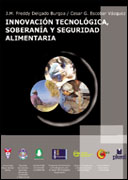
Innovación Tecnológica, Soberanía y Seguridad Alimentaría
Freddy Delgado, Cesar Escobar Vásquez, 2009
This book presents a critical analysis of the potentials and constraints of past and present models of developing agrarian innovations.
These innovations had low to non-existent impacts on the sovereignty and security of food production. They focused on linking indigenous food production to a market economy that was not able to guarantee reasonable prices to farmers, preventing them from covering production costs and basic needs for their livelihoods.
The attempt to overcome this one-sided policy in order to develop agrarian innovations in the context of a dialogue among scientific, indigenous and popular forms of knowledge was presented as an institutional experience developed by AGRUCO. This experience was developed during the last 15 years with active support from the Centre for Development and Environment, NCCR North-South and the Swiss Agency for Development and Cooperation.
 Download
Download
Read an extensive account of the book launch by Stephan Rist
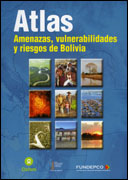
Atlas - Amenazas, vulnerabilidades y riesgos de Bolivia
Roger Quiroga B, Luis Alberto Salamanca, Jorge C. Espinoza Morales, Gualberto Torrico C, 2008
A unique atlas presenting threats, vulnerabilities and risks in Bolivia has just been published (in Spanish). The atlas is considered a highly relevant instrument for improving the management and mitigation of the ever-present natural risks in Bolivia.
According to Hernan Tuco, Vice-Minister of Civil Defence of the Bolivian Government, the atlas will serve as a “reference to the national, departmental and municipal authorities for taking decisions regarding containment and prevention of major disasters”.
Within the framework of the NCCR North-South, the atlas is a direct result of the Transversal Package Project (TPP) on ‘Social Vulnerability and Resilience’ and a related PAMS (Partnership Actions) project. The atlas was developed as a joint-venture between the Vice-ministry of Civil Defence and researchers of the NCCR North-South, OXFAM and the Foundation for Participatory Communitarian Development (Fundepco). The team of authors were lead by Luis Salamanca of the NCCR North-South.
For more details see
‘Agencia Boliviana de Informacion’ and
‘La Razon’.
To order the atlas, please contact
mdelafuente@supernet.com.bo in Bolivia or
Stephan.Rist@cde.unibe.ch in Switzerland.
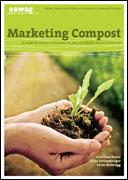
Marketing Compost
A Guide for Compost Producers in Low and Middle-Income Countries
Jonathan Rouse, Silke Rothenberger,
Christian Zurbruegg, 2008
Dübendorf, Zurich: Swiss Federal Institute of Aquatic Science and Technology (Eawag).
The many benefits of compost to agriculture, the environment and society are often poorly understood and little appreciated. As a result, compost producers around the world face great difficulties selling their high-quality products.
This book is designed to help compost producers in low and middle-income countries run viable initiatives by unlocking the financial value of their product. It includes practical advice, templates and inspiring examples of how
marketing techniques have been used in composting initiatives around the world.
 Download
Download
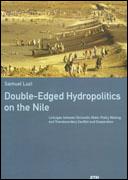
Double-Edged Hydropolitics on the Nile
Linkages between Domestic Water Policy Making and Transboundary Conflict and Cooperation
A dissertation presented by
Samuel Luzi, 2008
Zurich: Swiss Federal Institute of Technology (ETHZ)
This thesis focuses on domestic processes of water policy making in Egypt and Ethiopia in the context of transboundary conflict and cooperation in the Nile Basin.
It presents results at two different levels. First, the water sectors of Egypt and Ethiopia are analyzed with regard to their capacity to jointly design and implement effective and sustainable strategy for transboundary river development. Second, the study produces general insights regarding the nature of transboundary river conflicts and the challenges of conflict mitigation.
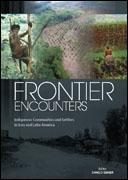
Frontier Encounters: Indigenous communities and settlers in Asia and Latin America
Edited by
Danilo Geiger, 2008
Copenhagen: IWGIA
Poverty and the maldistribution of land in core areas of developing countries, together with state schemes for the colonization of unruly peripheries, have forced indigenous peoples and settlers into an uneasy co-existence. On the basis of case study material from various Asian and Latin American countries, Frontier Encounters identifies characteristic patterns of interaction between these groups, explores the dynamics of some of the open conflicts that dot the map of the two continents, and situates them in the context of the politics and economics of the “frontier”.
Daniel Geiger is a doctoral candidate in Social Anthropology at the University of Luzern, Switzerland. He has lectured on political anthropology and indigenous movements. His research experience includes fieldwork in the Philippines and Indonesia. Under the auspices of the NCCR North-South, he has coordinated a comparative research project on conflicts between indigenous communities and settlers in South and Southeast Asia.
Available for purchase from:
IWGIA
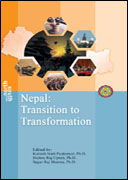
Nepal: Transition to Transformation
Edited by
Pyakuryal KN,
Upreti BR and
Sharma SR, 2008
Kathmandu: HNRSC, NCCR North-South
This book presents accounts of how Nepal is moving from a feudal, centralized, exclusionary monarchical state to an inclusive, federal republican nation. The book contains the role of the ten years of the armed conflict and the popular people's movement of April 2006 to bring enormous political and social changes in Nepal. The book also examines the role of foreign aid, situation of internally displaced people, relationship between land and conflict, and issues of pluralism, diversity and integration. Finally this book gives succinct ways forward for establishing political change and socio-economic transformation.
 Download book (1 MB)
Download book (1 MB)
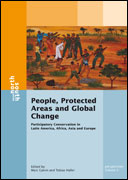
People, Protected Areas and Global Change
Participatory Conservation in Latin America, Africa, Asia and Europe
Edited by
Marc Galvin and
Tobias Haller, 2008
"This is an important contribution to the literature on protected areas and the political ecology of natural resource management and conservation. It provides a very timely analysis of "participatory" PA governance and management, examining "new paradigm" PA approaches which - in policy and rhetoric if not always in practice - offer alternatives to the fortress conservation approaches that have so often proved environmentally ineffective, socially disastrous and morally questionable [...]." Stan Stevens, Univ. of Massachusetts
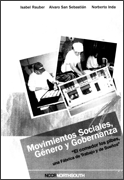
Movimientos sociales, Género y Gobernanza
«El comedor los pibes, una fábrica de Trabajo y de Sueños»
Edited by Isabel Rauber, Alvaro San Sebastián and Norberto Inda, 2007
The research presented aims to support the practical and concrete process developed by participants in the «Comedor Los Pibes», primarily because it was developed together with them . Because of this common work, its conclusions do not claim to comprise a list of recommendations to be followed by the participants. Following the observations, analyses and reflexions on this research, pratical-conceptual knots are identified, in order to help tackle and deepen critical reflexion about themes...
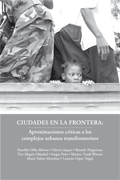
Ciudades en la frontera
Aproximaciones críticas a los complejos urbanos transfronterizos
Edited by
Haroldo Dilla, 2008
"Este es el resultado de una intensa jornada de trabajo e intercambios de una decena de reconocidos especialistas sobre temas urbanos fronterizos, que tuvo lugar en Santo Domingo del 4 al 10 de mayo del 2007. Consistió en un taller teórico internacional cuyas ponencias constituyen los artículos de este libro, la participación de los autores en el curso sobre fronteras internacionales que a la sazón desarrollaba Ciudades y Fronteras, la celebración de un foro público sobre desarrollo fronterizo..."
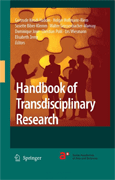
Handbook of Transdisciplinary Research
Edited by Gertrude Hirsch Hadorn, Holger Hoffmann-Riem, Susette Biber-Klemm, Walter Grossenbacher-Mansuy, Dominique Joye, Christian Pohl, Urs Wiesmann, Elisabeth Zemp, 2008
"Transdisciplinary research (TR) is an emerging field of research in the knowledge society. It relates science and policy in addressing issues such as: global and local environmental concerns, migration, new technologies, public health, socio-cultural change..."
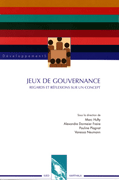
Jeux de gouvernance
Regards et réflexions sur un concept
Edited by Marc Hufty, Alexandre Dormeier Freire, Pauline Plagnat, Vanessa Neumann, 2007
La « gouvernance » est devenue un mot clé de la réflexion sur les sociétés. Cet ouvrage s’inscrit au sein des débats autour de ce concept, avec l’intention de contribuer à en préciser le sens, tout en illustrant les difficultés liées à son utilisation dans le domaine des relations internationales et du développement. Il représente l’aboutissement d’un débat et de patients travaux d’écriture à l’Institut universitaire d’études du développement...
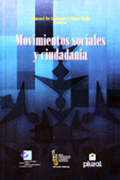
Movimientos sociales y ciudadania
Edited by
Manuel de la Fuente and
Marc Hufty, 2007
Latin America nowadays is in a new period of transformation, characterized by a multiplication of social movements and new forms of citizenship. Nevertheless, it is worth asking whether this period is different in relation to the long history of the continent. The contributions published here, written by scholars in the social sciences in Bolivia, Latin America and Switzerland, provide some key insights that shed light on this question.
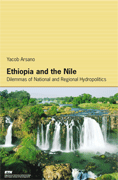
Ethiopia and the Nile
Dilemmas of National and Regional Hydropolitics
by
Yacob Arsano, 2007
This study discusses the national and regional dilemmas of hydropolitics in the Eastern Nile Basin countries of Ethiopia, Sudan, Egypt and Eritrea. At the national level, it highlights the dilemma between the need to develop available water resources to overcome debilitating poverty on the one hand, and the risk of limited institutional and financial capacity to develop such water resources on the other. At the regional level, the paradox between unifying and divisive factors is outlined.
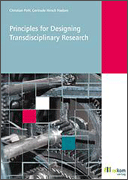
Principles for Designing Transdisciplinary Research
by
Christian Pohl and Gertrude Hirsch Hadorn, 2007
"In the information or knowledge society, there is a need for transdisciplinary research, i.e. research that deals with complex life-world problems. Transdisciplinary projects aim to come up with practice-oriented solutions that serve what is perceived to be the common good. In order to achieve this, they transcend disciplinary boundaries and include the perspectives of public agencies, the business community and civil society in the research process. This process is therefore particularly challenging for those involved."
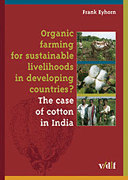
Organic farming for sustainable livelihoods in developing countries?
The case of cotton in India
by
Frank Eyhorn, 2007
Based on the example of cotton farming in India, this research examines in how far conversion to organic management can be a viable option for improving the livelihoods of farmers in developing countries. While cotton cultivation provides livelihood for an estimated 10 million Indian households, stagnating cotton yields, high input costs and low cotton prices have led many of them into indebtedness. By substituting synthetic fertilizers and pesticides with farm-own resources and labour, organic farming not only could have the potential to improve natural resource management, but also to reduce production costs and obtain a better price for the produce.